Prime Minister Sir Keir Starmer is set to discuss European security and the potential ramifications of a second Trump presidency during his talks with French President Emmanuel Macron in Paris.
On Monday, President Macron and Sir Keir Starmer commemorated Armistice Day at the Tomb of the Unknown Soldier beneath the Arc de Triomphe. According to Downing Street, the two leaders are scheduled to discuss Russia’s invasion and the humanitarian crisis in Gaza during an upcoming meeting.
Their meeting occurs amid growing inquiries regarding US President-elect Donald Trump‘s stance on Ukraine, following his assertion that he could resolve the conflict with Russia “in one day”.
Trade is set to be a focal point, as Trump has announced plans to implement a sweeping 20% tariff on imports entering the United States.
Economists have raised alarms regarding the worldwide consequences of these tariffs, with one prediction estimating a potential £22 billion impact on UK exports.
In a significant diplomatic gesture, Macron extended a personal invitation to the prime minister, marking Sir Keir as the first British leader to attend the prestigious Champs-Élysées ceremony since Churchill in 1944.
Sir Keir engaged with French Prime Minister Michel Barnier before participating in a minute’s silence commemorating the 106th anniversary of Armistice Day.
During the commemorative events, Sir Keir and Macron placed a wreath at the Winston Churchill statue in Paris before proceeding in an open-roof car to inspect troops near the Arc de Triomphe.
The meeting will cover several significant topics, including Ukraine, the Middle East, migration, and the government’s initiative to “reset” relations with the EU.
Leaders are set to discuss strategies to optimize the positioning of Ukraine’s forces as winter approaches. The potential use of long-range Storm Shadow missiles by Ukraine to strike deep into Russian territory is a topic that warrants significant discussion.
After months of deliberation, the pivotal figure for London and Paris remains President Biden, indicating that no significant progress is anticipated today.
Following Trump’s victory in the US presidential election, concerns have emerged regarding the implications of a potential second term for American support of Ukraine and NATO.
During the weekend, the Washington Post revealed that Trump has engaged in discussions with Vladimir Putin, advising the Russian leader against escalating the conflict any further.
The Kremlin refuted claims of a phone call, asserting that the article published by the Washington Post “does not correspond at all to reality”.
UK Defence Secretary John Healey stated that if the reports regarding the call are accurate, “President Trump is exactly right to warn Putin against escalation in Ukraine.”
In an interview with BBC Breakfast, he expressed his anticipation that the United States would continue to show unwavering support for Ukraine, citing the robust nature of bipartisan backing within the nation.
“We have intensified our support for Ukraine, accelerating the delivery of aid and increasing our financial commitment to the country to unprecedented levels,” he stated.
The United Kingdom and France have emphasized that supporting Ukraine in its conflict with Russia is crucial for the overall security of the European continent.
Former President Trump has urged NATO members to boost their defence budgets, warning that he would allow aggressors like Russia to act freely against those who fail to meet their spending commitments.
During his election campaign, Donald Trump refrained from detailing his strategy for resolving the conflict between Russia and Ukraine within a single day, suggesting that it may entail brokering a deal acceptable to both parties.
Bryan Lanza, a former aide on Trump’s 2024 presidential campaign, conveyed to the BBC that Ukrainian President Volodymyr Zelensky must adopt a “realistic vision for peace” that does not include the cessation of Russia’s annexation of Crimea.
A spokesperson for Donald Trump clarified that Mr. Bryan “does not speak for him,” effectively distancing the former president from the controversial remarks.
The meeting on Armistice Day between Starmer and Macron takes place amid escalating hostilities between Ukraine and Russia.
Over the weekend, both sides engaged in their most significant drone assaults since the onset of the conflict. Russia’s defence ministry reported the interception of 84 Ukrainian drones across six regions, with some reportedly nearing Moscow.
On Sunday, Treasury Minister Darren Jones appeared on BBC One’s Sunday with Laura Kuenssberg programme, where he announced the government’s intention to raise defence spending from 2.3% to 2.5% of the national income.
He should have specified when the target would be achieved or if it would be met before the next election, which is anticipated to take place by 2029.
On Sunday, Sir Keir participated alongside fellow political leaders and members of the Royal Family, including the Prince and Princess of Wales, in the annual National Service of Remembrance ceremony held at the Cenotaph in London.
King Charles presided over a solemn two minutes of silence, honouring the memory of individuals who sacrificed their lives in the two world wars and other conflicts.
On Armistice Day, a two-minute silence will occur at 11:00 GMT, mirroring the observance held on Remembrance Sunday.
The conclusion of World War One is commemorated at 11:00 on the 11th day of the 11th month in 1918.












